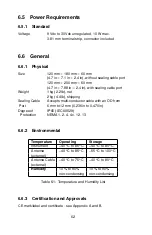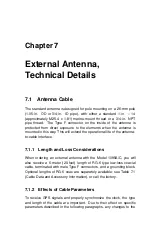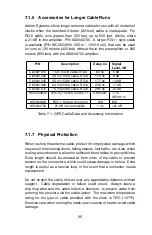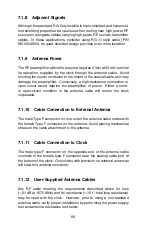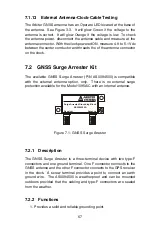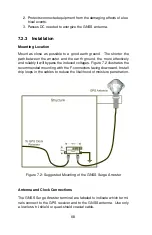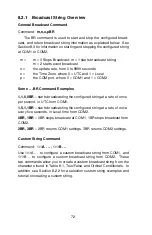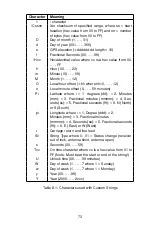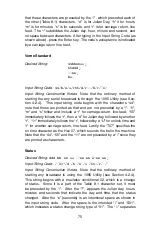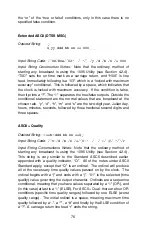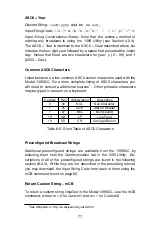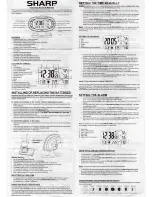
the “or" of the “true or false" conditions, only in this case there is no
specified false condition.
Extended ASCII (DTSS MSG)
Desired String:
C
Q_yy_ddd_hh:mm:ss.000___
Input String Code:
/T0D/H0A/[03? /:?/] /y /d:/h:/m:/s.000
Input String Construction Notes:
Note that the ordinary method of
starting any broadcast is using the 1095 Utility (see Section 4.2.4).
“T0D" sets the on time mark as a carriage return, and “H0A" is line
feed. Immediately following is a “03", which is a “locked with maximum
accuracy" conditional. This is followed by a space, which indicates that
the clock is locked with maximum accuracy. If the condition is false,
then it prints a “?". The “/:" separates the true/false outputs. Outside the
conditional statement are the normal values that are broadcast at the
chosen rate. “y", “d", “h", “m" and “s" are the two-digit year, Julian day,
hours, minutes, seconds, followed by three fractional second digits and
three spaces.
ASCII + Quality
Desired String:
<
soh
>
ddd:hh:mm:ssQC
Input String Code:
/T01/d:/h:/m:/s/{01? /:./:
∗
/:
#
/;?/}/r
Input String Constructions Notes:
Note that the ordinary method of
starting any broadcast is using the 1095 Utility (see Section 4.2.4).
This string is very similar to the Standard ASCII described earlier
appended with a quality indicator, “Q". All of the notes under ASCII
Standard apply, except that “Q" is an ordinal. The ordinal will produce
all of the necessary time quality values passed on by the clock. The
ordinal begins with a “{" and ends with a “}". “01" is the selected (time
quality) value governing the output character. Ordinals are a sequence
conditional, meaning that you have values separated by a “/:" (OR), and
(in this case) at last is a “/;" (ELSE). For ASCII + Qual, there are four OR
conditions (specific time quality ranges) followed by one ELSE (worst
quality range). The initial ordinal is a space, meaning maximum time
quality followed by a “.", a “*", a “#" and finally by the ELSE condition of
a “?". A carriage return line feed “r" ends the string.
76

